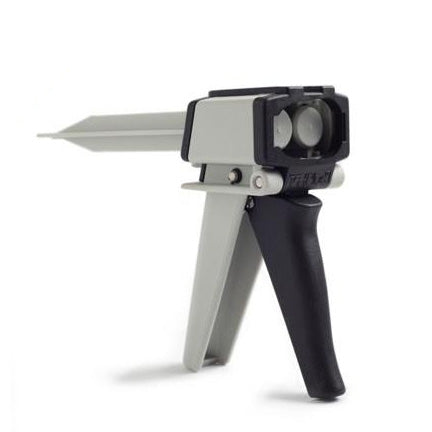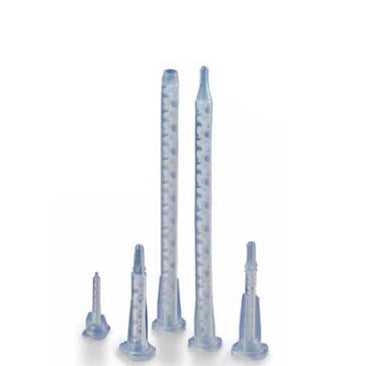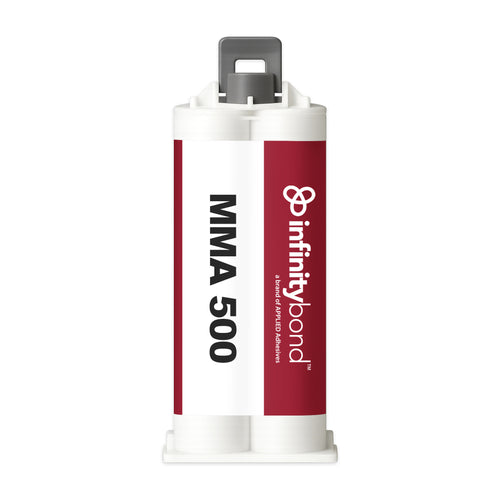Adhesives for Polystyrene Plastic
What Is Polystyrene Plastic?
Polystyrene (PS), sometimes referred to as just styrene, is a thermoplastic polymer made from the styrene monomer. Polystyrene can take several forms, including foam, film, or plastic. It is designated with recycling code 6.
Polystyrene plastic is a rigid plastic that is transparent, moderately strong, and brittle. Polystyrene is also lightweight, has a low shrink rate, is easy to mold, and offers good electrical insulation. Common applications for polystyrene plastic include:
- Food packaging
- Construction insulation
- Medical equipment
- Electronics
Considerations for Bonding Polystyrene Plastic
Polystyrene plastic can be bonded through solvent welding as well as with adhesives. While there are several adhesives for polystyrene and it's relatively easy to bond, there are a few notable considerations.
One consideration when using glues on polystyrene plastic is its lower surface energy. While it does not have as low a surface energy as polyethylene and polypropylene, it has a lower surface energy than PVC or PET plastic. This lower surface energy can make it more challenging for some adhesives to wet out for strong and lasting bonds. For this reason, choosing the right adhesive and performing proper surface preparation is imperative.
Polystyrene can also be sensitive to solvents. While cleaning may not be necessary for all adhesives, mild cleaners like isopropanol should be used. Avoid acetone and other strong solvents that could damage or deform the material.
Polystyrene plastic can also be prone to stress cracking over time. Be mindful of the adhesive cure process and try to avoid long dwell times. You may also want to consider adding a stop or control into the joint to minimize the potential for stress cracking.
While these products are trusted and reliable, the best adhesive for polystyrene will be dependent on the specific application. If you have questions about what adhesive is best for your application, you can speak with our team.
Polystyrene Glue Recommendations
When gluing polystyrene, adhesive selection is critical. You need a trusted product that can overcome any challenges that come with bonding polystyrene plastic. While every application is unique, our team shares some of what we believe are the best glues for polystyrene plastic. You can try a sample on your application.
-
![Infinity Bond CA-SI Surface Insensitive Super glue 1 oz Bottle]()
Cyanoacrylate: Infinity SI CA Glue
This high-performance cyanoacrylate is a great glue for polystyrene. The surface insensitive formulation means it can bond more difficult surfaces like polystyrene without the need for a primer. The adhesive comes in a wide range of viscosities from 5 cps to 4,000 cps to meet various application needs.
-
![Structural bonding adhesive for metals, fiberglass, and plastics – Infinity Bond MMA 420 1:1 50 ml Cartridge, fast set]()
MMA: MMA 420 Adhesive
There are several MMA adhesives for polystyrene that can get the job done, but we recommend the MMA 420 because it is so versatile. The adhesive has a high level of chemical resistance, temperature resistance, weather resistance, and impact resistance compared to some other MMAs. It has a working time of around four to six minutes. This adhesive is also a cost-effective alternative to Plexus® MA420.
-
![ASI MP 55420 methacrylate MMA adhesive 50ml cartridge]()
MMA: ASI MP 55420
Another option for a methyl methacrylate for polystyrene, this high-performance adhesive is able to bond to polystyrene with limited surface preparation. It has a working time ranging from about four to six minutes and has a fair level of weather and temperature resistance.
-
![50 ml A-System Cartridge of Infinity Bond EP 420 – 2:1 epoxy, 20–30 min open time, strong bonds for industrial materials]()
Epoxy: EP 420 Epoxy
If strength is a big concern, then this adhesive may be the best choice for you. It has a toughened formula that is designed for better impact and shock resistance. The adhesive is also resistant to weather and extreme temperatures so it can be used in more challenging bonding environments. With a working time of 20 to 30 minutes, this epoxy is great for larger bonding areas or applications where components need time to be adjusted.
-
![50 ml cartridge of 3M Scotch-Weld DP420 off-white-epoxy adhesive]()
Epoxy: 3M DP420
Similar in specs to the EP 420, this epoxy also has a high resistance to weather and extreme temperatures so it can perform well in harsher environments. It has a work life of around 20 minutes for positioning needs or larger surface areas. This product also meets UL 94 HB flammability standards.
While these products are trusted and reliable, the best adhesive for polystyrene will be dependent on the specific application. If you have questions about what adhesive is best for your application, you can speak with our team.
Types of Glue for Polystyrene Plastic
Because it is relatively easy to bond, there are several polystyrene glues you can use. Some common types of glue for polystyrene plastic include:
- Cyanoacrylate Glues- Fast cure times but lower strength
- Epoxy Glues- High shear strength and chemical resistance but limited flexibility
- MMA Adhesives- Less surface preparation required and faster cure times but lower strength than epoxy
- Two-Part Polyurethane Adhesives- High amount of flexibility and impact resistance but solvents may damage the surface
Of course, the exact bonding capabilities will vary from product to product, and what is a great choice for one application may not work for another application. You should always review the product's technical datasheet to see if it is compatible with your bonding requirements and test it.
How to Bond Polystyrene Plastic
Polystyrene plastic may have a lower surface energy and is sensitive to solvents, but it is still relatively easy to glue polystyrene to polystyrene or another material when you take the right steps.
Surface preparation varies from one adhesive to another with some requiring more steps than others. It is usually recommended that polystyrene plastic is cleaned and degreased before the adhesive is applied. Because it can be sensitive to solvents, you should use isopropanol or another milder solvent for this step.
The next recommended step is often to gently abrade the surface with grit blasting or sanding. This abrasion makes it easier for the adhesive to wet out the surface. After abrasion, the surfaces should be cleaned once more to remove contaminants left behind. Leave the materials to dry completely before the adhesive is applied.
When bonding dissimilar substrates, you need to ensure that the adhesive is not only suited to the environmental bonding requirements but also that it is compatible with both materials. Testing the adhesive is often the recommended best practice before committing to the product.
Cure times vary widely from product to product, so always follow the manufacturer's recommendations for best results. You should also be mindful of the suggested safety procedures associated with the adhesive you are using.
Find the Best Adhesive for Your Needs
The best adhesive for polystyrene will be largely dependent on the application. If you are unsure which polystyrene adhesive to use, we want to help. Our team has worked with various applications involving polystyrene plastic and can provide you with a personalized product recommendation. You can try samples of these products and test them on your application.
Try These Adhesives on Your Application
Frequently Asked Questions
The best glue for polystyrene is dependent on several factors, including the bonding environment, end use, production process, bond design, performance needs, and the type of polystyrene. MMAs, cyanoacrylates, and epoxies are common choices for rigid polystyrene. On the other hand, spray adhesives, low-temperature hot melts, or water-based adhesives may be better suited for polystyrene foams.
While some adhesives require minimal surface preparation, it is generally recommended that you clean the surface with a mild solvent to remove dust, grease, and other contaminants before applying the adhesive. Some adhesives also recommend light abrasion before application.
Yes. Some epoxies are compatible with polystyrene. That being said, you should check the product’s technical datasheet to be sure, and epoxy is not always the best choice depending on the application.
Ask a Question
Have questions? Our team of adhesive experts can help. Submit your questions and we'll get you answers right away. We're here to help.












